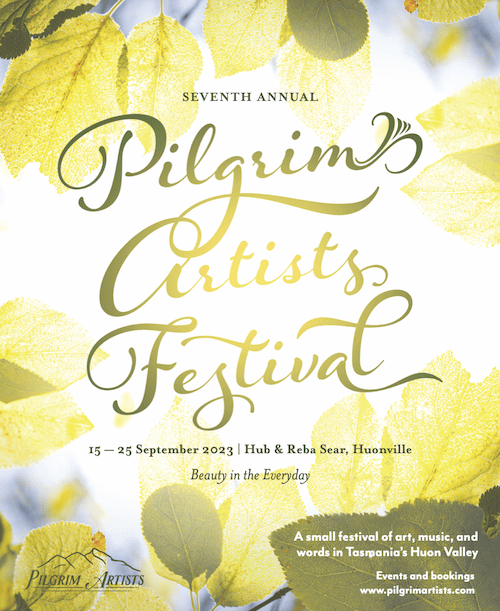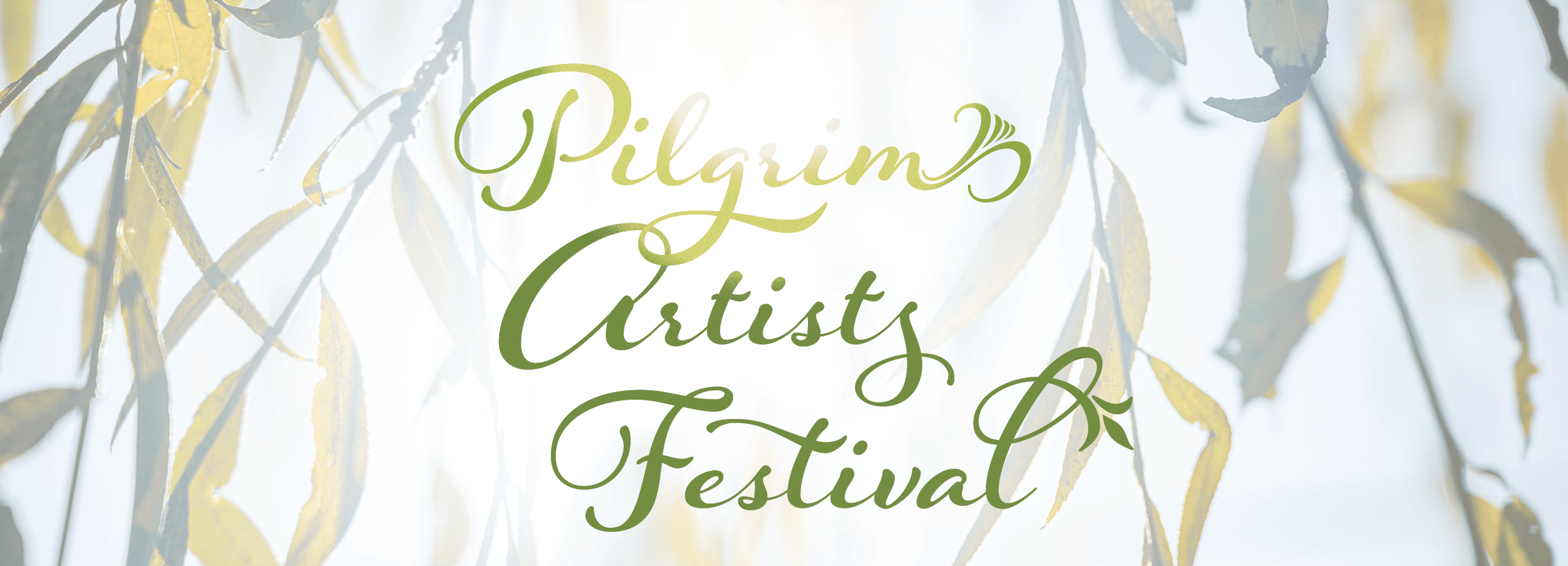Pilgrim Artists Festival - 2023 Literary Finalists
For our 2022 Pilgrim Artists Festival, we invited literary submissions of fiction, non-fiction, and poetry in three age brackets: adult (18+), teen (13-17), and child (12 and under).
Below you'll find the winners, finalists, and runners up in the Adult age bracket. You can read the youth entries here. And if you'd like to compare with past winners, feel free to visit 2022, 2021 and 2019. (The 2020 festival was cancelled due to the pandemic.)
Writers for the 2023 festival had a maximum of 500 words to explore our festival prompt: Beauty in the Everyday. They were encouraged to reflect - from a Christian perspective. Then, all entries were judged anonymously by an independent team of literary curators. That is, the curators had no idea whose work they were evaluating. These curators chose three finalists from a competitive field in each category at each age level, for you, the public, to vote on in person at the festival.
Adult entrants were eligible for:
-
- In poetry, the $250 Wandering Bookseller Prize for Poetry, and a $100 Wandering Bookseller gift voucher;
-
- In non-fiction, the $250 Soul Tread Prize for Non-Fiction, and an annual Soul Tread pack (valued at $100);
-
- In fiction, the $250 W.R. Gingell Prize for Fiction, and a $100 Wandering Bookseller gift voucher.
Fiction
Adult Finalists
Downstairs Shift
By Sarah Downes
Azrael yawned. He was bored. The small crowd of poster-toting protesters outside the building had meant that this morning’s work had been minimal at most. Not that it really mattered. He’d been stationed in the express lane anyway. ‘Light duties only,’ one of the bosses had said.
He stretched, and plucked a dandelion from the grass next to him. It looked a bit different from the ones upstairs. Those were all big and fluffy - strongly aromatic and with a glowing golden heart. The kind of thing that people down here liked to chop up and send into funeral homes after he’d visited. In comparison, this one was small and mean looking, with twisted roots and a sour scent that coated his fingers for hours afterwards.
He had already started to dig the roots out the crack in the pavement when he noticed that the protesters had begun to move away from the front door. It was nearly lunch time and the heat had hit its peak. One by one, they moved down the street, but they left a little pile of pamphlets just outside the door. Azrael picked one up and opened it. There was a picture of a baby inside. ‘So that’s what they are supposed to look like!’ he wondered. He’d never seen them with all their limbs attached before.
A young woman who had been crying in her car for the last hour brushed past him and quickly opened the door before hesitating for a moment on the step. ‘Don’t do it!’ he tried telling her. He always tried, but humans rarely listened. Most of them didn’t want to hear him anyway. He began to reach out again, but she’d already passed through. He didn’t panic though - he’d received confirmation that upstairs had picked this soul out specially, and those dandelion roots could be pulled out properly while he waited.
He didn’t have to wait long. It was always amazing how quickly the thing could be done. Before long, a beam of light shot out of the window and a young man landed on the grass next to him. He was writhing a little and holding the top of his head as though it would float away. Azrael turned to him. ‘Hello,’ he said.
‘Hello,’ gasped his new companion, ‘Who are you?’ ‘I’ve come to take you home. Express.’
The young man’s eyes widened. ‘That was over quickly!’ he said. ‘I was just beginning to recognise her voice.’
‘You’ll see her again. Her story is just starting.’
‘And mine?’
‘This is the end chapter. But also the start of a new book. You know, the one that never has an ending.’ ‘Oh.’ The young man suddenly looked a little crestfallen.
‘What’s wrong?’ asked the angel.
‘It’s just...I was looking forward to meeting the thing they call ‘dog’. And ice-cream. I’ve already craved it.’
Azrael laughed. ‘Oh, we have dogs. Plenty. And lions. And the One who invented ice cream? He’s waiting to greet you.’
The Girl in the Tower
By Suzannah Rowntree
Imagine this: you are a girl, locked in a tower.
Does it matter why? Let’s say your parents made a bargain with a witch—a golden-haired daughter for a bunch of parsley. So now you are the girl in the tower. Your only company (apart from the witch, but her visits are worse than nothing) is a book.
The book is full of stories, all the same. Once upon a time, a girl was cursed by a witch to live alone, until a prince rescued her with a true love’s kiss. They lived happily ever after.
You don’t know what alone means, because you’ve never been anything else. Still, the book insists that true love is the best thing that could possibly happen to a girl.
You put your faith in the book. You make songs about love.
Sometimes, even in the heart of the forest, someone hears your song. You have a marvellous voice, as golden as your hair. The book assures you that handsome princes cannot resist the golden singing of golden girls.
Except that they do.
Some block their ears and hurry away (they think you are a wood-siren, luring them to their doom). Others stop only to tell you your hair is a vanity and so are your songs.
One wishes to behold your face, but the climb is too daunting.
Years pass. You begin to understand what alone means. Alone means that you could gnaw your own flesh if it meant that someone, anyone, would climb your tower.
At last, one day, someone does. He hears your singing, and he doesn’t block his ears. He climbs your golden hair, and says it is glorious.
He says your songs are beautiful.
He says he must go, because his true love awaits him at home.
This is a possibility for which the book never prepared you, but it makes perfect sense. Only true love could give a man courage in the face of song, strength to climb a tower, heart to comfort a lonely girl.
You gnaw on your own flesh and you feel tenderly grateful to his true love, whom you have never seen.
He returns. (You never quite believed he would, because why would he, when he has a true love at home?) Alone doesn’t need to be your name, he says. How many years was it since you felt hope? Perhaps, beyond this tower, your own love is waiting for you.
Or perhaps you’ll slip, and the witch will find you out. She’ll blind the prince, cut off your hair and abandon you both in a howling wilderness.
You’ll be free, but you won’t go looking for a love of your own, not yet. You’ll look for him, because he may not be your love, but he's the nearest thing you have. You’ll never rest till you’ve healed his hurts and sent him home.
Imagine this: that after all there are more ways than one to love, and all of them are true.
Take and Eat
By Ingrid Vanderstoep
Our daughters are seventeen. They have both spent many months in hospital. Mine with schizophrenia. Hers with Lou Gehrig disease. We see each other at school events, but we haven’t spoken.
Tonight we are at the same party. I see Esther watching her daughter. Grace is talking with friends and looks well. Her mother smiles and looks away.
I see that faltering smile. She is fine. We are all fine. We do not ask, What has become of my beautiful child? How will she cope in the adult world? What did I do wrong?
I want to tell her what I tell myself. That our daughters are seeds. They are falling, falling to the ground and one day they will be planted, and what they will be we cannot imagine. But I am afraid. And besides, my own heart cries, Now. What about now?
My daughter is talking to a little girl. They look alike. I see my daughter in her flannel pj’s. She has tucked a doll into her t-shirt and propped two more against the couch. She sets a hanky tablecloth before them. Wooden pears, blue china teacups, and a plastic bottle of orange juice that never runs dry.
How painful hope is. I want to see my daughter married. I want to drink tea in her kitchen, pull weeds in her garden, fold her washing. Why does God give us this life if he is only going to sweep it all away, like a forgotten dream? Set your mind on things above where Christ is seated. But didn’t Christ himself climb into the wet womb of a young girl, break into this world and cry in her arms? For God so loved the world.
Our daughters are talking to each other now. Esther says, “I didn’t know your daughter was in hospital.”
“Yes. Three months.”
“How did you cope with that?”
I look over at my daughter eating pizza. I see her pacing in the High Dependency Unit at the hospital. She doesn’t know where she is; who I am. She has torn out the front part of her hair. She can’t speak. I coax her to sit by me on the floor. We lean against the wall while I feed her little pieces of bread and cheese. She opens her mouth like a bird.
“It was hard.”
“Sometimes my daughter can’t even feed herself,” Esther says, looking embarrassed.
We are two wells dug deep by sorrow.
“Her friends are driving, starting uni, but she gets more dependant every day.”
Suddenly I see Christ at his mother’s breast. More dependant than he has ever been.
I hear our daughters laughing. They laugh riotously, their heads thrown back, their laughter like a fountain, deep and wide.
This dear child. This dear world. This dear Christ.
“I’m not always sad,” Esther says emphatically.
I pour two glasses of orange juice. Esther breaks off a piece of pizza and hands it to me.
Adult Runners Up, Fiction
Kamloops, Canada
By Michael James
He rams his foot into the stiff carbon boot: firm, spongey liner drags against the tops of his toes and the balls of his ankle, as he forces the foot deep into the orifice. Finally he feels his heel land on the boot floor and his toes wiggle with claustrophobic motion, far down, as far as the tunnel goes. Woven, waxed laces squeeze his foot as he pulls them through each ladder rung of eyelets and ties them in a thick, firm bow. The shell of the boot feels so solid it’s kind of angry. Not a flexy, bendy, plastic boot: strong, certain carbon exoskeleton crustacean shell. The boot and the foot and the leg and the wheels are one. Stiff, sure, fused. The frames a shiny aluminium, the wheels a bright, fluro orange, gripping the ground below.
He stands on the skates in the chill, moist, borealis, septentrional gloaming. All is still, ghostly, vacant. He is alone, alive, alert. He pushes off and leans into the racing surge of wheels set in motion. Gliding power translates from the core to the hips to the legs to the earth, and the scraping thrusts of his wheeled feet throw him forward. Flying on the crust of the planet, both weightless and full of immediate muscle and motion. Soon he is far out, deep on the highway, just barely feeling the ugly bumps of the rough surface above the incredibly tall cushion of orbiting urethane.
Soon he is feeling the burn in his thighs and the shrinking of his lungs; and hearing the racket of more and more birds and seeing more and more landscape emerge from grey twilight to full colour. And still he sweeps and surges, limbs lunging with rhythm rolling and every part of his body alive and aching; every breath and heartbeat pounding and gasping. He is lost in himself, reconciled to himself, fully himself. Metal car missiles roar past him; monstrous trucks rumble in a deafening hazardous windstorm. Still he rolls endlessly, rolls meditatively, rolls into the dawn light, deep in forests and hills.
In the hours of rolling, he is body and soul. He is time and eternity. He is powerful and vulnerable. It fills him, it soothes him, it purges him, it awakens him. As he rolls he thinks of nothing; simply burns and gasps in a pure and mindless moment. As he rolls he digests his rage, bitterness, confusion, disappointment. As he rolls he dives deeply into the fear and genius of fatherhood; mysterious financial desires; the ecstasy and panic of being a lover, a life partner, a stranger in his wife’s bed; the grief and longing of brotherhood. As he rolls he knows everything and solves nothing. Ploughing the concrete sea in safe delight. He can do nothing for he is nowhere, he can say nothing, for he is alone.
Non-Fiction
Adult Finalists
Knitting Nanna
By Ruth Amos
It was pure coincidence that I learned to knit at the same time I became a grandmother, though the way those facts dovetail so beautifully definitely helps me remember when my knitting hobby (obsession?) began.
I took up knitting because I needed something to keep my hands busy while I edited my podcast, watched TV, or listened to audiobooks. I had been using Candy Crush as my go-to no-brain-needed activity and the app had become a problem for me.
It took a podcast about addiction to wake me up, but eventually I noticed that every time I rose from my computer for even thirty seconds, every time I sat on the couch, every time I stopped actively engaging my brain with work or with people, I opened the game on my phone and started playing. It was an addiction, and a completely unproductive addiction at that.
Not that I'm saying every moment in your life must be productive. No. Rest time, mindfulness, even boredom, these are all of vital importance for the creative mind. But this game was none of those things.
So, I took up knitting, starting with a long scarf of large grey stitches, many holes, and varying width. Turns out, I enjoy learning new knitting skills: yarnovers, left- and right-leaning increases and decreases, striping, cables, all the many different ways that the two major stitches in knitting — the knit stitch and the purl stitch — can be combined to produce an almost infinite variety of garments.
This works in life as well. The four bases in the DNA chain: thymine (T), guanine (G), cytosine (C) and adenine (A), combine in infinite variation and the outcome is an infinite variety of people. One of my grandsons has hair that is so fair and fine that at a year and a half he still looks almost bald. The other was born with a headful of thick black hair. One has gorgeous bright blue eyes, the other, beautiful deep blue, almost black. Slightly different combinations of T, G, C and A have been knitted together to form incredibly different little boys.
The oldest knitted garment known is a pair of socks from Egypt, dated at about the 11th century, but God has been knitting for much longer than that. Psalm 139 says "You knit me together in my mother's womb. I praise you because I am fearfully and wonderfully made". God shows his boundless creativity in the variety of human beings on the planet, in the beautiful plants and animals surrounding us, and even in the variation in the weather each day.
I enjoy partaking in his creativity every time I pick up my needles and put together combinations of knit and purl. It is a beautiful way of keeping my hands busy, and I truly love being a "knitting Nanna".
98 Anderson Road
By Esther Fan
He turned 90 last month but refused celebrations. His only daughter passed away earlier that year and “how can we make party when she’s not here?”. Instead, he stayed home, the only home he’s lived in since Italy - “I have no English then!” - remembering her playing with the neighbourhood kids - “We knowing everyone then!”. He nursed his wife in this home, in her forgetful, fading years. Now, he’s alone - “I’m no watch TV, I just put on for company, you know”.
She’s a third of his age, lives in the townhouse next door - though not during waking hours. She lives a scheduled life - scurrying between work, band practice, babysitting and... 98 Anderson Road.
She first started visiting because the Bible said ‘Love thy neighbour as thyself’... and .. the latter she did very well. But now, it's more. Turns out, God was giving more than just a command.
When she visits, his world comes alive. His eyes and voice too - but he mustn’t talk fast because these dentures hurt. He turns up his hearing aid. She reports. The station was repainted, the lantern festival’s dumplings authentic. He leans forward in his chair and imagines.
When she visits, her world stops - as if the doorbell is a pause button - and she can breathe. Not that she wasn’t respiring adequately on the soccer pitch just prior. But between sips of tea (strong, with a dash of milk, he knows now) her body can breathe, her brain too.
Sunday his grand-niece in Sicily rang, after 10 minutes the landline disconnected. The cleaner came Monday, did a terrible job again - “I can make more clean myself, but company I like so I won’t fire her”.
He had a GP revisit on Tuesday - all outings are health related - returned with “another medicine - do you believe, dear!”. She does believe him, but he rises, shuffles to the cabinet and tosses her a box. “Makes me bloody thirsty and pissing always!”. He jabs his stick at her, “You a doctor - tell me, what’s it?”.
The son-in-law brought groceries on Wednesday, didn’t stay for coffee but thankfully remembered fish, because “Fridays, Catholics must eat fish”. His funeral must be in church - “I must remind them...” - unlike his daughter’s in a funeral home, “without hymn, priest, communion!!”. And now she’s gone, “I put TV for company, you know”.
She nurses her tea, nibbles cashews (her favourite – he knows now) and reaches for the Bible. “Where’d we read to?”. He leans back in his chair. She dog-ears where she finishes.
She rises, her mind starts treadmilling. It’s an overloaded week but “I'll try come next Sunday” (a lie – she will come next Sunday).
“I’m always here, dear,” he says, “but don’t come if busy. I no expect nothing” (also a lie – he does expect her).
Two lies, one truth. In spending an hour in each other’s lives, they find more beauty in their own.
The Sole That Watered My Soul
By Leng Te
Three years later, a grainy, monochrome image of my son's perfectly-formed sole in utero still fills me with as much awe and hope as it did on first sighting.
We discovered I was pregnant just before the first of Melbourne's six lockdowns began. We didn't know, of course, that it would be the first of many lockdowns, or that for the next two years we would be swimming in an ocean of uncertainty and fear.
I had two young children already, and those pregnancies had been straightforward enough. But I was older now. And my news feed was full of horror stories about overrun hospitals and women giving birth in isolation. After having a long, drawn-out first labor, I could not fathom having to endure another one without my husband by my side. Uncertainty was the tip of the iceberg. Deep abiding fear lurked below.
And yet, there in all its grainy glory is a captured still of magnificent, ordinary perfection: a wonderfully formed, tiny foot appeared as if to say, 'I am here and I am ready to travel. Where are we going?'
That one solitary foot spoke of a lifetime of hope. That he will walk in places I may never go. He will chase after dreams far larger than any I may have for myself. He will stand on the shoulders of giants who have gone before and he will step into a future that we merely laid foundations for. I hope.
Ah, hope. That word we clung onto through the long season of dark mystery. The voice that kept us walking, shuffling, taking steps, however small, until we discovered that the dark cloud was behind us. We couldn't see a way through, but hope urged us on. After all, 'hope that is seen is no hope at all. Who hopes for what they already have?' (Romans 8:24, NIV)
The image was a beacon to our current reality, and to the days to come. Now in the rare moments of stillness before he sleeps, when he bids me to sit next to him as he drinks his milk, I often hold his feet in my hands and feel their strength and solidity. No longer just a two-dimensional image of a tiny form, these are the beautiful feet that push, propel and carry him as he explores the world.
What steps will you take, little one? What sensations await these feet of yours? Where will these feet be put up for rest? What adventures will come from the wondering and the wandering?
Wherever you roam, in the light or in the dark, I pray that hope will keep you walking, son.
I pray, and I hope.
Adult Runners Up, Non-fiction
The Pebble
By Anthony Dekker
My young relative hands me the treasure she has just found — a pink pebble. Pink is particularly beautiful to her eyes. “What a beautiful pebble!” I say to her. She smiles at me.
I bring the pebble up to my eyes for a closer look. From that vantage point, it is revealed to be a tiny crystal garden. It is not uniformly pink — only about half of it is made up of red, pink, or orange crystals. Those would be some kind of feldspar, I guess. Most of the other crystals are white and grey, and I am sure they must be quartz. Some of the crystals are dark — almost black — but they scintillate in the light as I turn the pebble, just as its young discoverer flashed an eldritch smile when I shared her joy. Are the dark crystals mica, perhaps? I’m not sure, but I do point out the differently coloured crystals to my young geologist. One of her treasures from an earlier occasion was a quartz crystal, so our pebble has a kinship to a previous discovery.
The crystals in our pebble are surprisingly large. They must have taken a long time to grow, because beauty takes time. I imagine that our pebble resulted from the slow cooling of molten rock. To cool that slowly, it must have been cooling deep underground. So how did it wind up in my young relative’s delicate hands? Was it uncovered by the massive machinery of mining engineers? Or can we thank the relentless persistence of wind and rain wearing down the rocks that hid it away? I have no way of knowing.
Whichever it was, at some point our pebble must have spent a great deal of time being washed along by a river or stream. It may be made of crystals, but there is no trace of sharpness as I run my thumb over the surface. In fact, our pebble is silky-smooth to the touch. Thousands of tiny collisions with grains of sand in the water have worn away all trace of roughness, completing the creation of our little treasure.
I return the pebble to its discoverer. “Shall we thank God for the pebble,” I ask?
Turnip Seeds
By Tara Gardener
The basket has been hanging from a high point on the ceiling, above the fireplace, for a long time. Months. Of all the days I thought "I must deal with that", today turns out to be the one. I stand on a chair to get the basket down. It has accumulated some dust. It contains an old yellow sheet wrapped around some straw-yellow stalks with attached seed pods.
I take the basket outside and get my seed extracting equipment-a colander with big holes and a beautiful wooden bowl. I am not for the 'gently burst open each pod individually' method. I bunch the fine, pod-encrusted stems into the colander and start massaging them enthusiastically, breaking up and crunching the stalks and bursting open the seed pods. Seeds and chaff are falling through the holes of the colander. There's a lot coming out. Each small pod holds about ten seeds. When I'm satisfied that the broken up trash has yielded it's goodness, I sprinkle it as a mulch among some calendula and borage plants out the front of the kitchen. I'm sure a few turnips will spring up in that good soil.
Now for my favourite part...winnowing. There is a perfect light breeze. I get another bowl, glass this time and start pouring my chaff and seed mix from one bowl to the other. As I pour the mix from as high above the catching bowl as I dare, again and again, the little light flecks of pod and stem get carried away by the breeze and the seeds rain into the receiving bowl. Little bits of chaff cling statically to the glass bowl after the seeds have fallen and I can blow the bowl clean, with my eyes closed so I don't get chaff in my eyes. After about three minutes of pouring back and forth I have pure turnip seed, beautiful little dark grey spheres of potential. I use a funnel to put my seed into a small, perfectly dry amber bottle. It's three quarters full. That's a lot of potential turnips.
This bounty is the harvest from just a couple of wispy branches from one single turnip that went to seed. I'm marvelling. The whole plant must have produced 50,000 seeds at least That's a conservative estimate. My mind starts composing maths questions.
If you saved 50,000 seeds from one turnip plant and planted all of them and they grew into turnips and then each of these plants produced another 50,000 seeds, how many turnip seeds would you reap?
The answer, folks, is 2,500,000,000. That's two billion, five hundred million for those who struggle to verbalise big numbers. Or two and a half gigs as my husband helpfully advises. That increase could happen within a year.
So many turnip seeds are burgeoning into existence, just in my garden alone.
I think the carrot seed heads I have stuffed thickly into a paper bag are about to blow my mind.
Poetry
Adult Finalists
Benediction
By Laura Cerbus
The days are too long and the nights come too early.
My legs waver and
my arms droop and
my feet ache.
This labour of love, this daily ritual of care:
a cross-marked life that seems a far cry
from the glory of that tree.
My house looks different than it used to.
Scattered toys and gummy floors —
remains of breakfasts,
furtive snacks stolen in secret.
There’s chalk on my window screens
and crayon on the wall.
These and other toddler-sized holes
and toddler-sized spills now proclaim
the presence of my dear ones.
I’ve scrubbed and I’ve mopped,
stooping down on bent knees,
breathing deep
for the strength
to do
just this one
more thing.
Even so —
A gentle lullaby,
a soft warm cheek,
messy fingers,
smelly feet.
Grubby hands grab on to my clothing,
leaving their benediction for me,
and their arms,
outstretched,
invoke the presence of God.
Curly Girl
By Jacqueline Law
Recalcitrant strands, only more so
with age and inattention
and the vagaries of
oestrogen’s Storm Season,
she sighs and decides:
let them be curly.
Hydrate them! Condition, soak,
saturate them! Drench in-
tense moisture, seal it
in with heavy oils, butters,
custards and crèmes. Like dessert,
the magic of weightlessness.
Dry them slow. No terry towelling, or
two thousand watt blow.
The creation of ‘cast’, allowing
nature to sculpt each unique curl
like it does with seashell and
seedpod, holding life within.
She has become afraid to disturb them.
Friction is the enemy, yet
Friction is her reality. Pressure,
movement, tossing and touching,
turning and tying. Snag.
Knot. Pull. Split. Break.
She cares, yet knows not how to care
for the daily needs of curls.
She buys a silk pillowcase in hope
for her, and for the refugee woman
who made it, but finds, at night,
not righteousness
instead, joy! The silk on her cheek
strokes like a tender, loving hand
to soothe all her cares, all her fears,
all her efforts to be worthy:
Shhh, you are safe here.
Shhh, you can be soft here.
An Ideal Afternoon
By David Noor
A book for each,
in view, the sea,
A tall cold drink
or steaming tea,
And you,
and me.
Adult Runners Up, Poetry
On the Origin of Milk
By Esther Fan
Daddy, (slurp) where does milk come from?
Milk, darling, (sigh) comes from
Alarm clocks at 3am
motorbikes at 4
Hours with quarters
and showers of modified grass.
The sweet smell of silage
The stench of instant coffee
Calloused hands and muddy brows
praying for rain and cursing the wind.
Finish your glass, darling, for
Milk
is a precious commodity
I Am
By Mishka Gora
Baked limestone fragments and fragrant
Pine needles, a ring of torsos silhouetted
Against aquamarine glare. Tanned bodies
Soak in Adriatic tears, waterplay belies horrors
Of the recent past. Where are you from?
A clumsy question. In response
incantations summoning the dead:
Vukovar, Sarajevo, Travnik, Mostar.
Paradise is named Jerusalem no more.
Tiny waifs present bright drawings
Of charming cottages afire and mothers
Lying below soldiers with guns.
I praise their skill and ask
Is this your home? They nod
Unabashed and smiling, with an inner
Faith that might never have been.
And their triumphant existence
Becomes my private jubilation.
Ivan presses blanket cotton
Into my palm, a cross of knots
Stolen from insufficient warmth.
Two hundred and seventy-one days
He whispers. The relentless torture
Is not what he remembers. His army green
Concentration camp souvenir lies frail
In my limp hand, and the creases
On his face smile.
A crowd mills on burnished steps
Of Dalmatian marble. There is no room
In the church yet they stay.
Drawn by salt water and torn by duty,
I follow Ivan into the throng
and over the threshold where babbling voices
Are silenced by a man in vestments.
I don’t dare look at the disc he holds aloft,
But I see it. It is reflected
In Ivan’s eyes. They are no longer dull.
He shouldn’t be alive and I shouldn’t
Be here, but he is and I am.
Yahweh, I murmur, I am.
Darkness is dispelled, and numbness
Warms in sunlight unseen. Momentary
Amnesia takes hold. The war
On everyone’s lips ceases to exist.
Children giggle, widows envision
Reunion with veterans whose limbs and
Dreams are long gone, and nothing
Matters except that we are
Conscious and breathing.
Special Thanks
We are so very grateful to Soul Tread, The Wandering Bookseller and W.R. Gingell for sponsoring our adult literary prizes.
All works on this page are copyright their original authors. The Pilgrim Hill Association Inc has been granted a permanent but non-exclusive right to publish these works. We hope you enjoy them.






